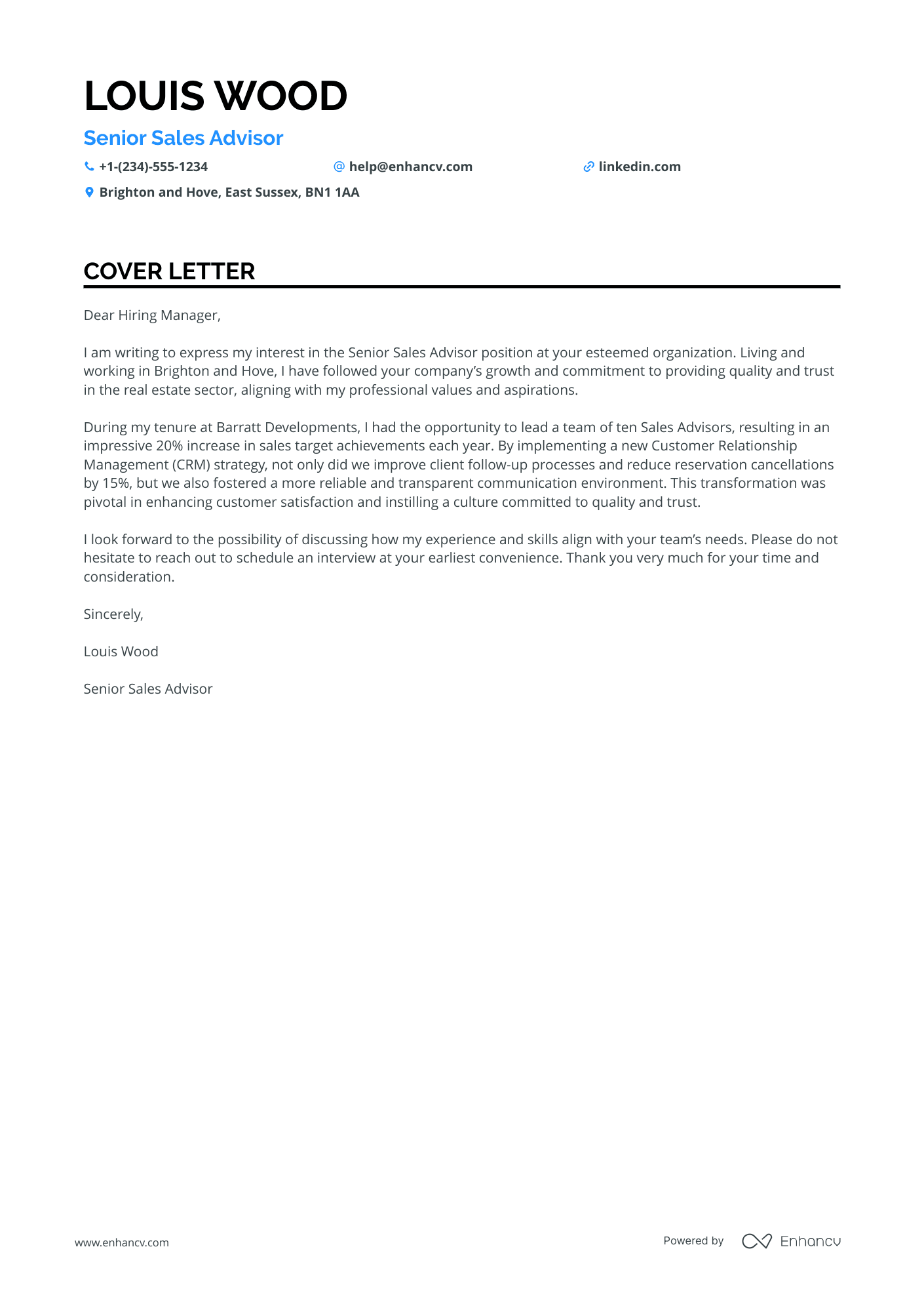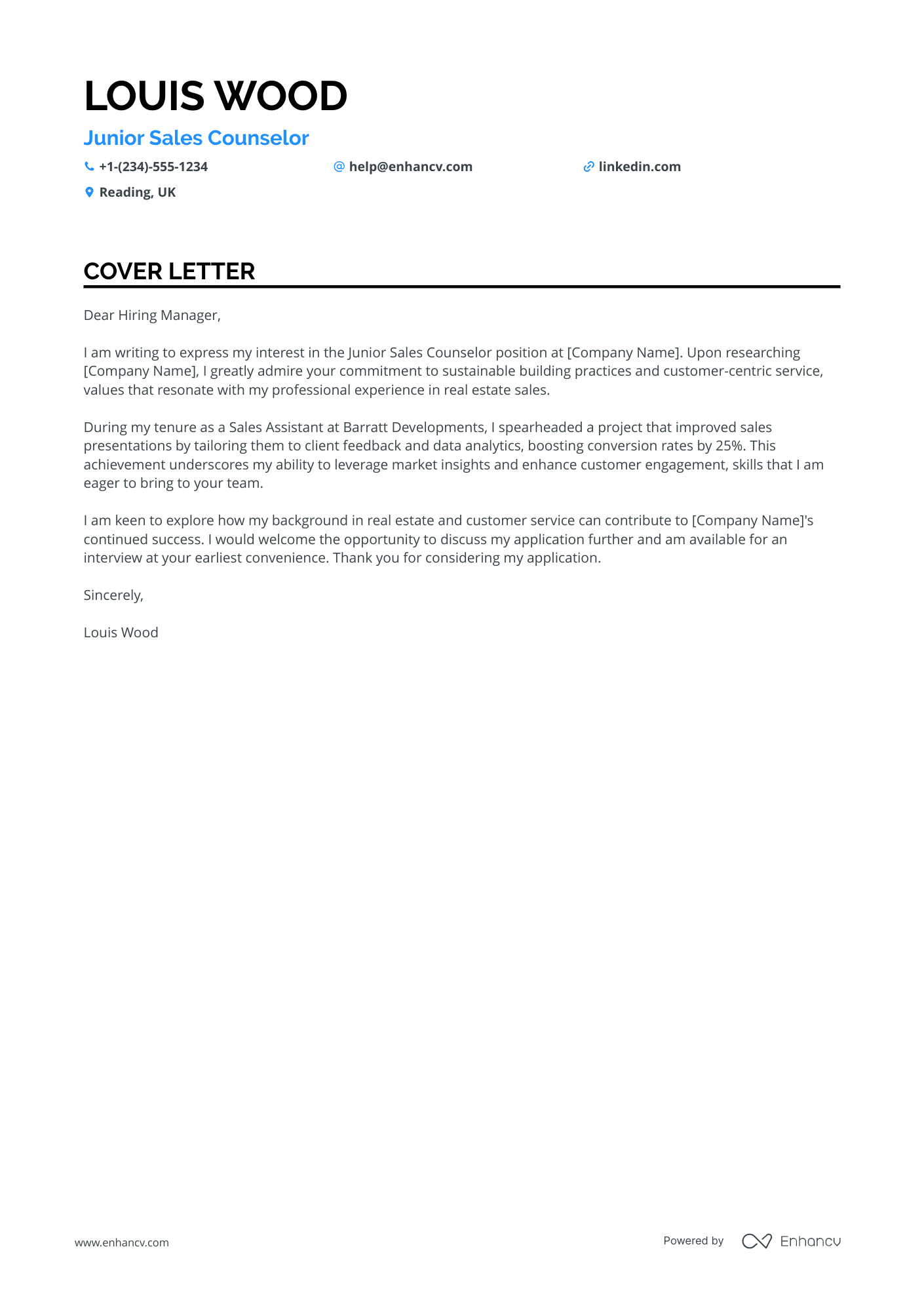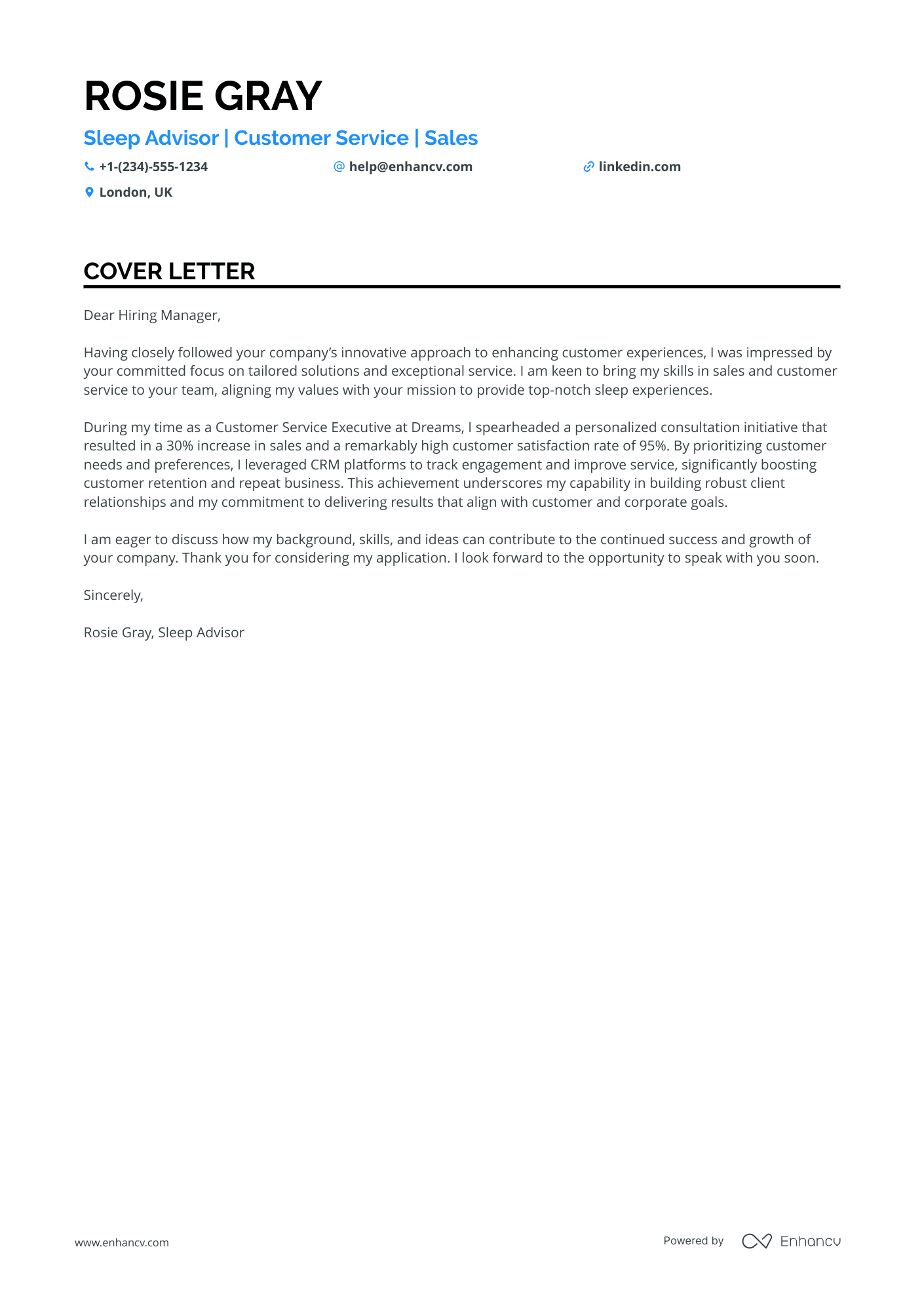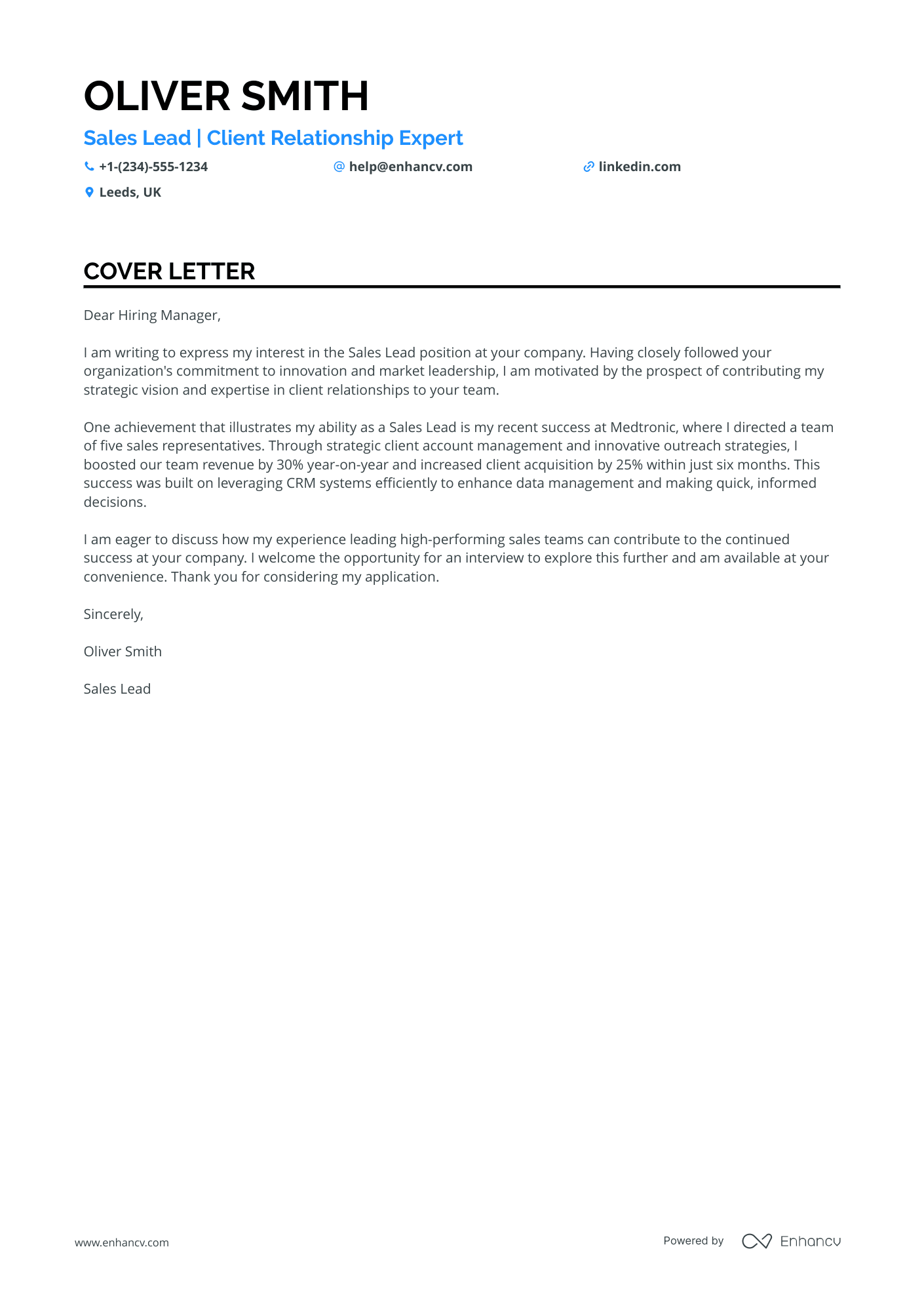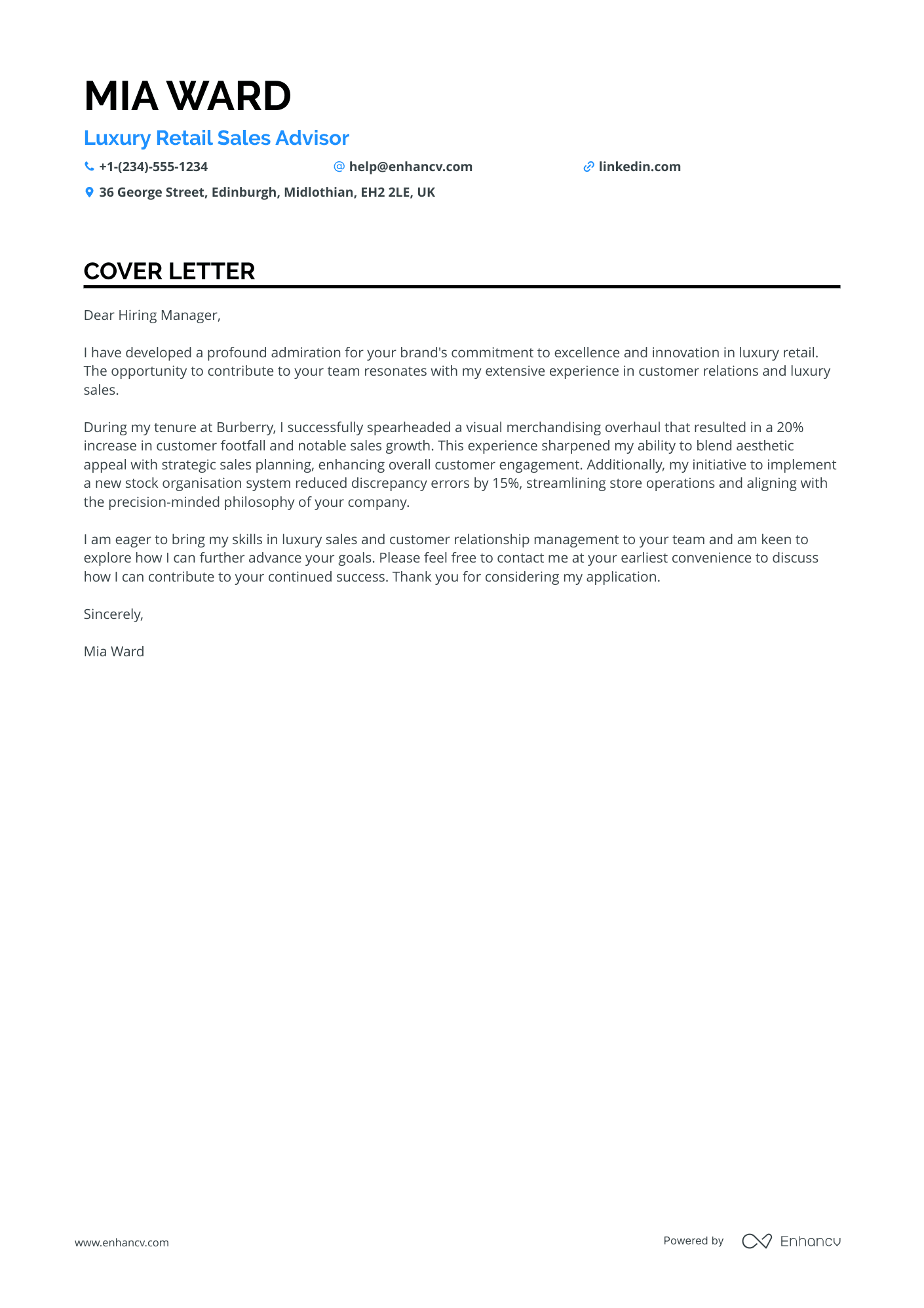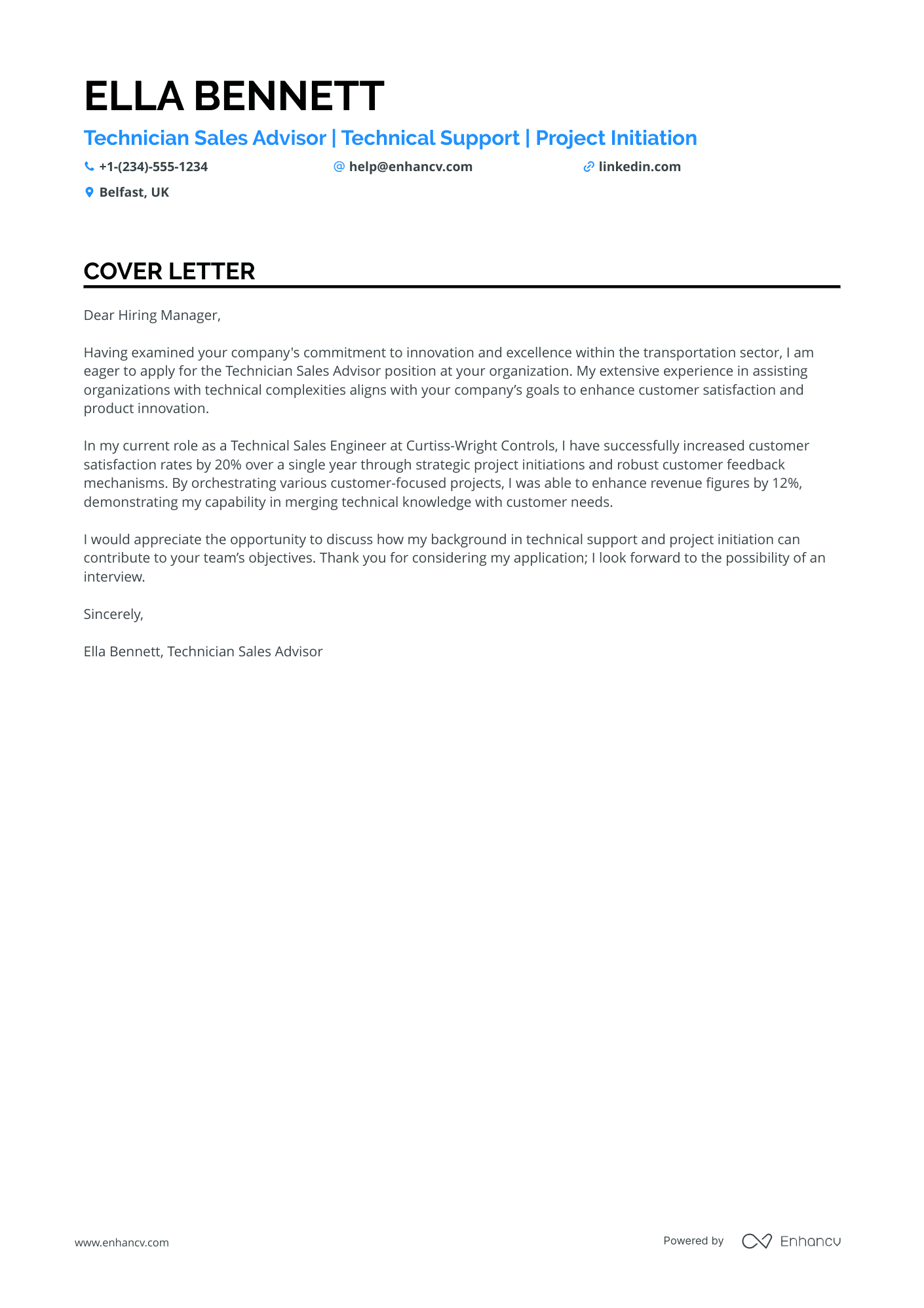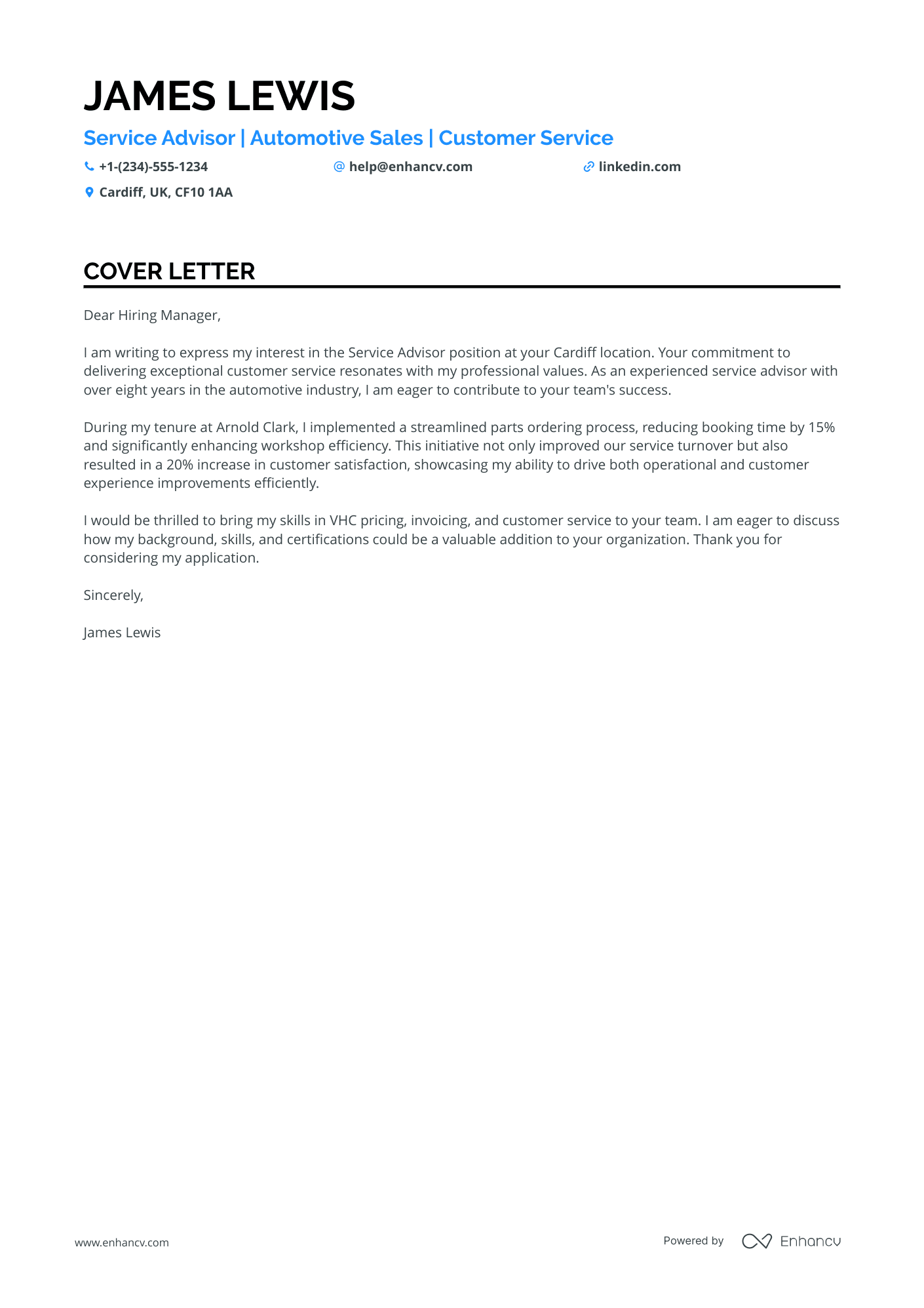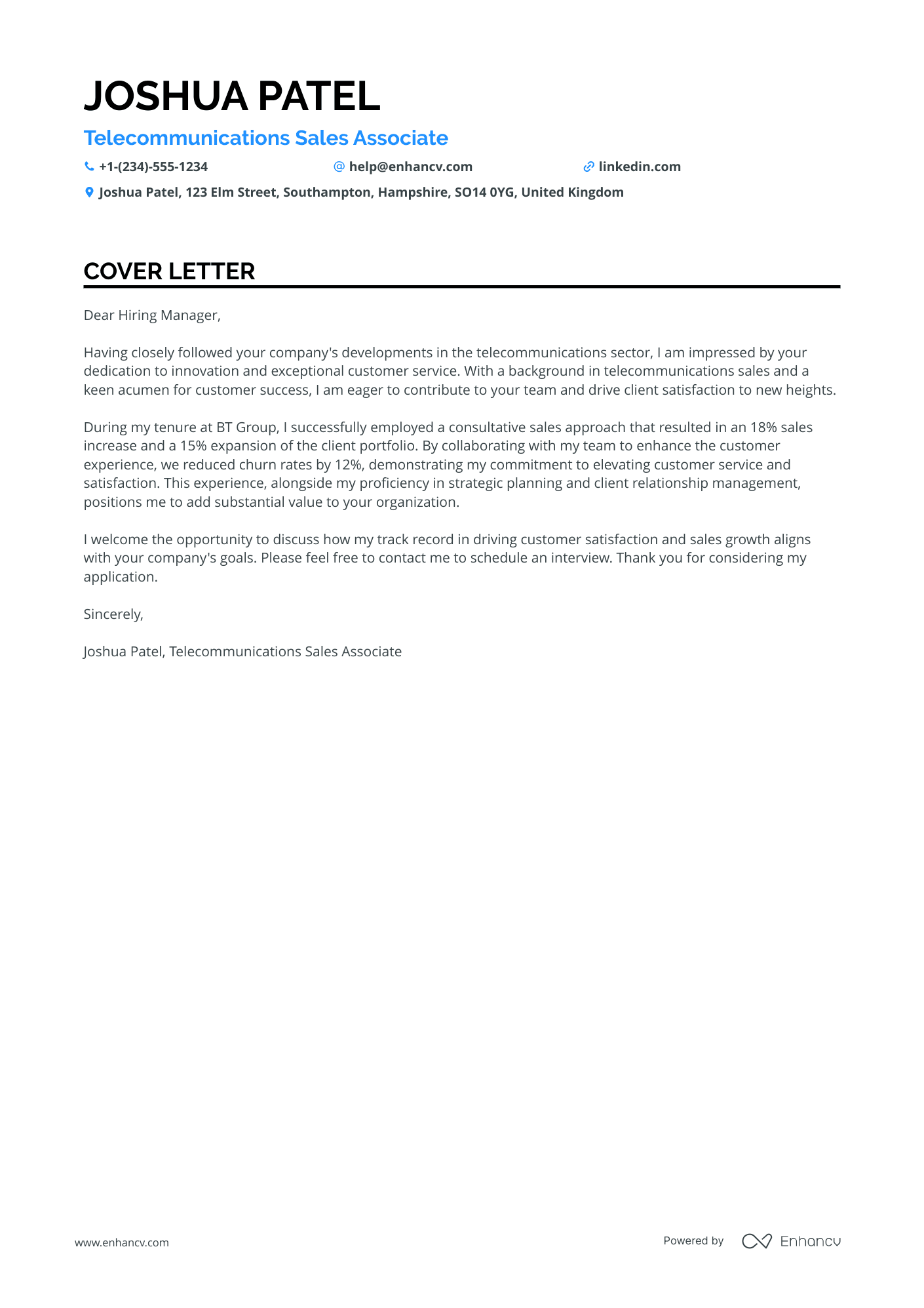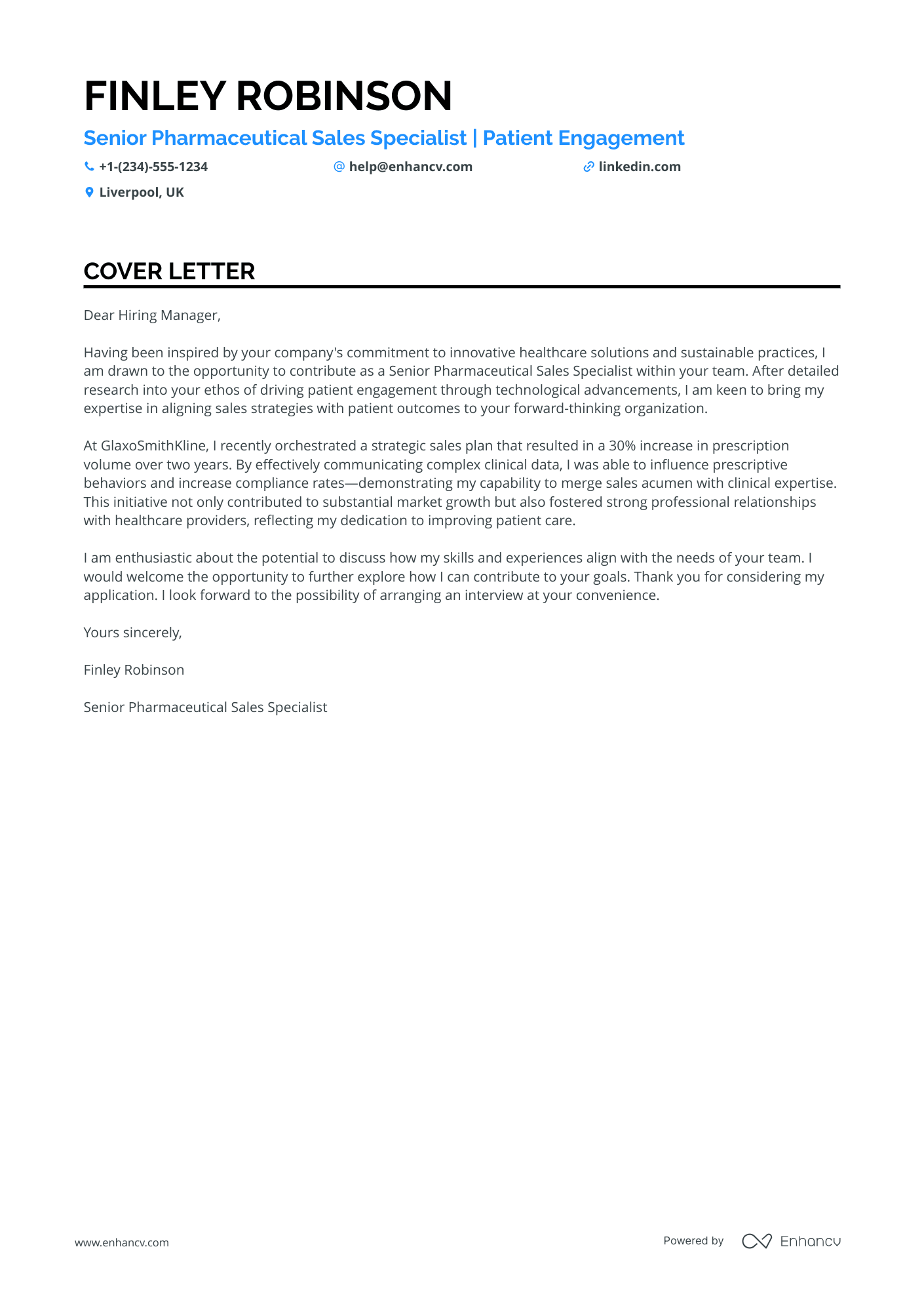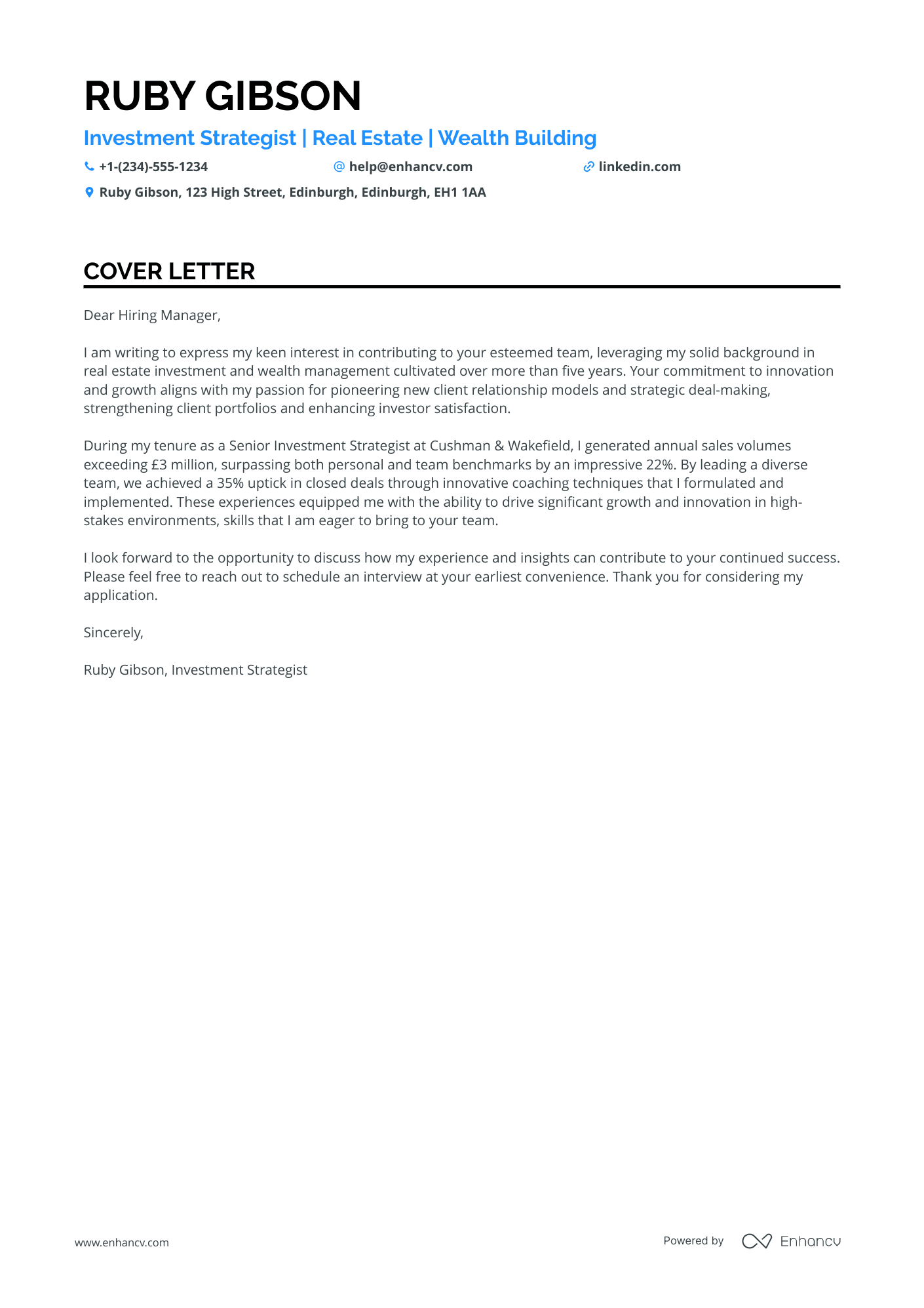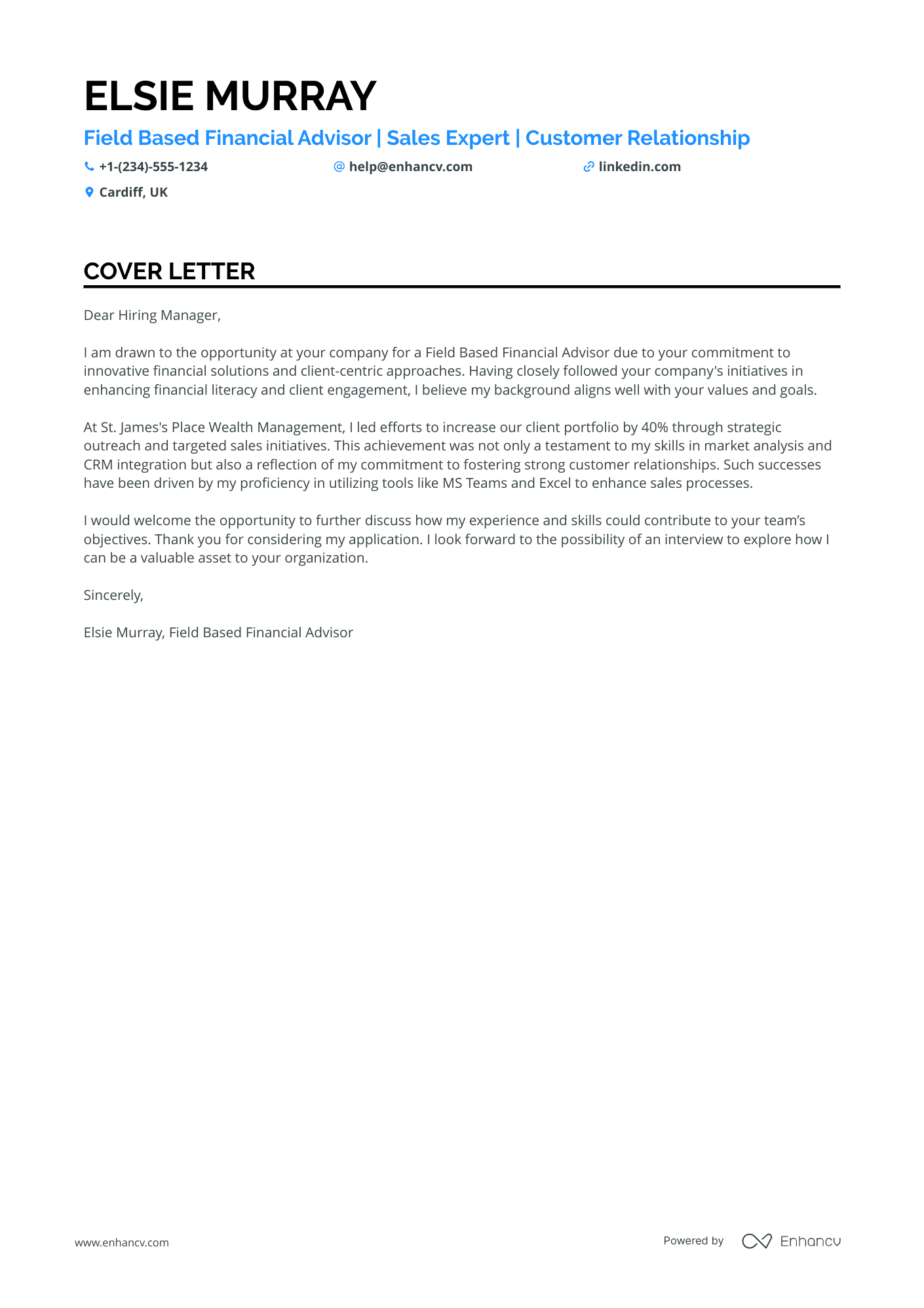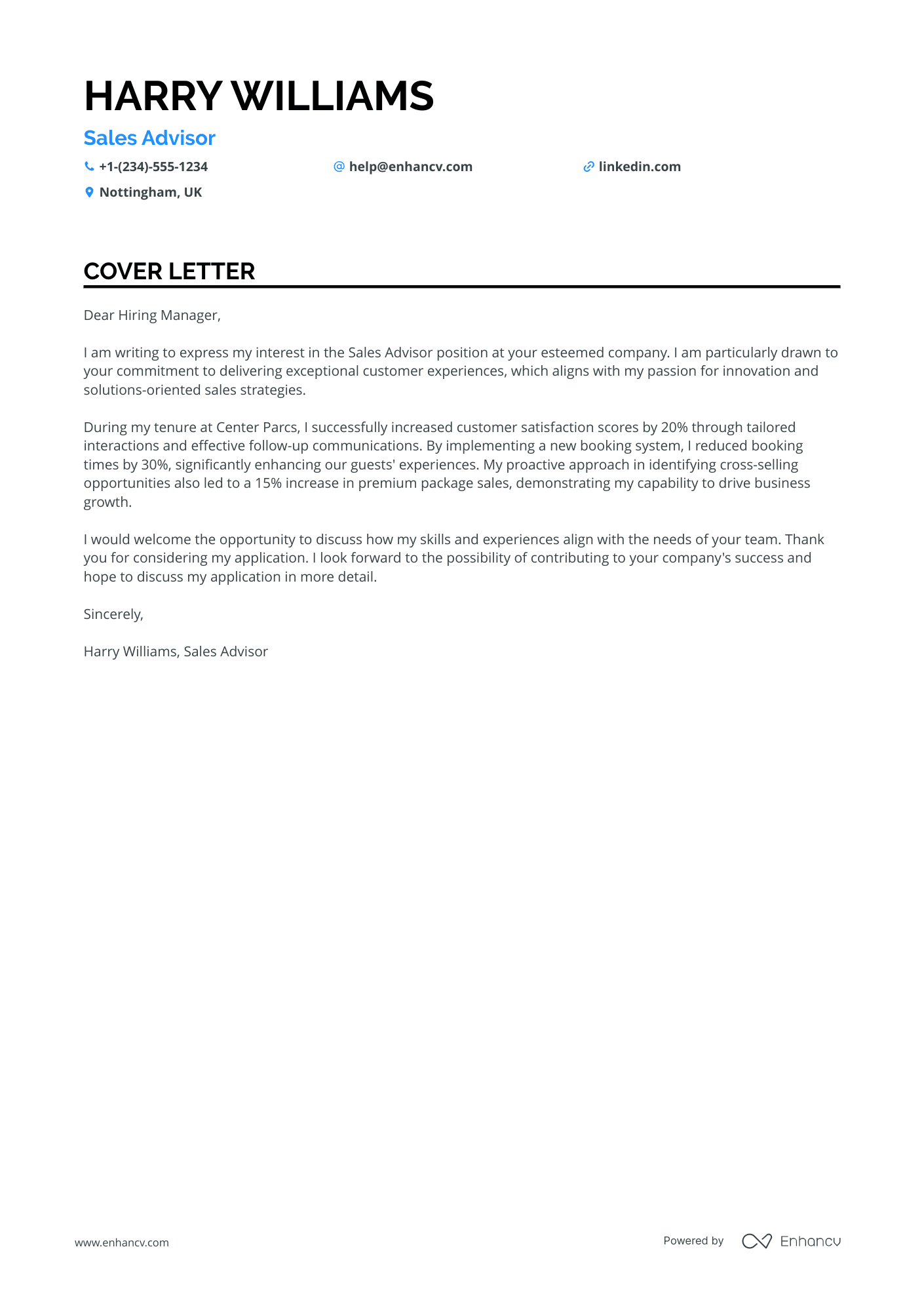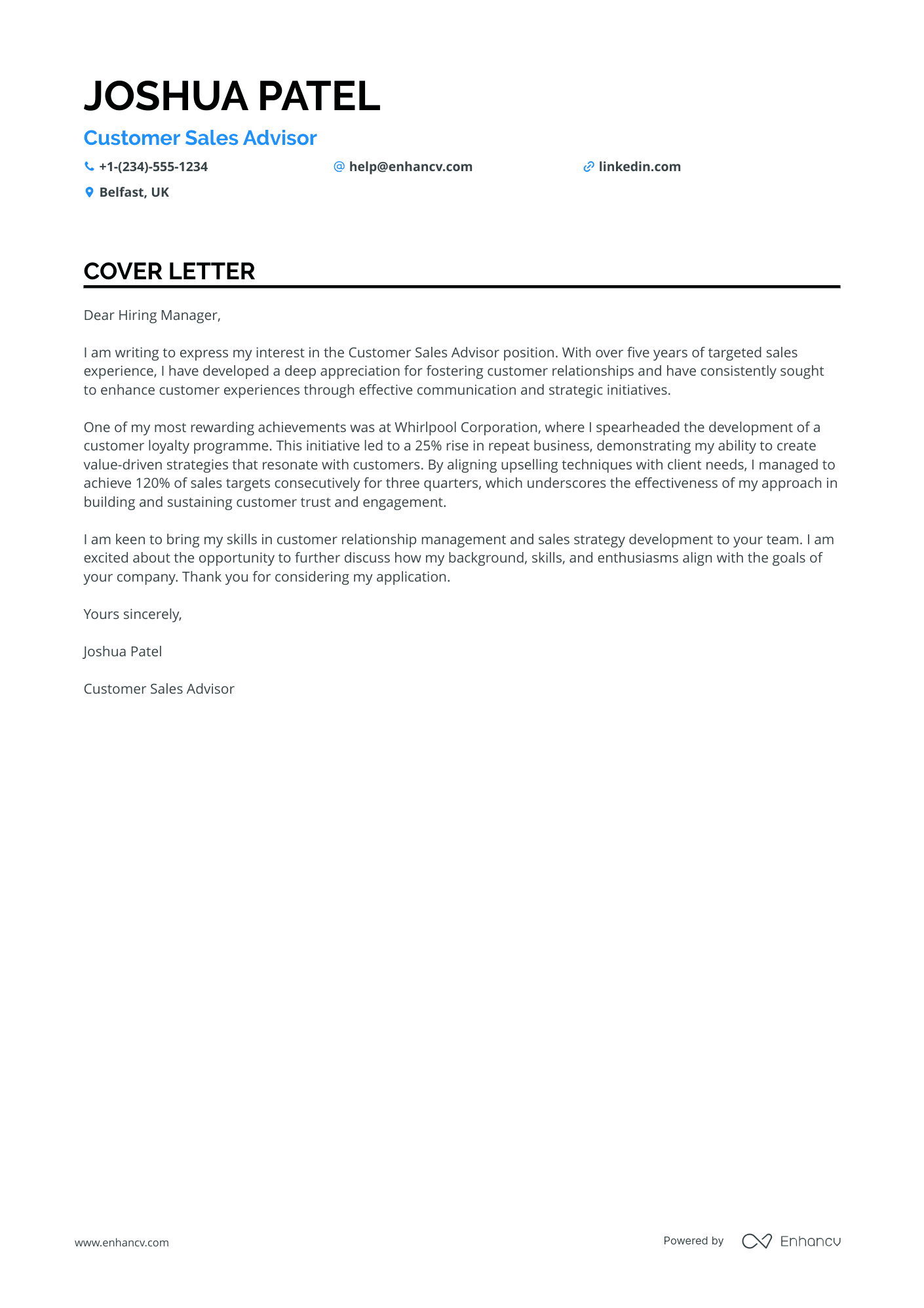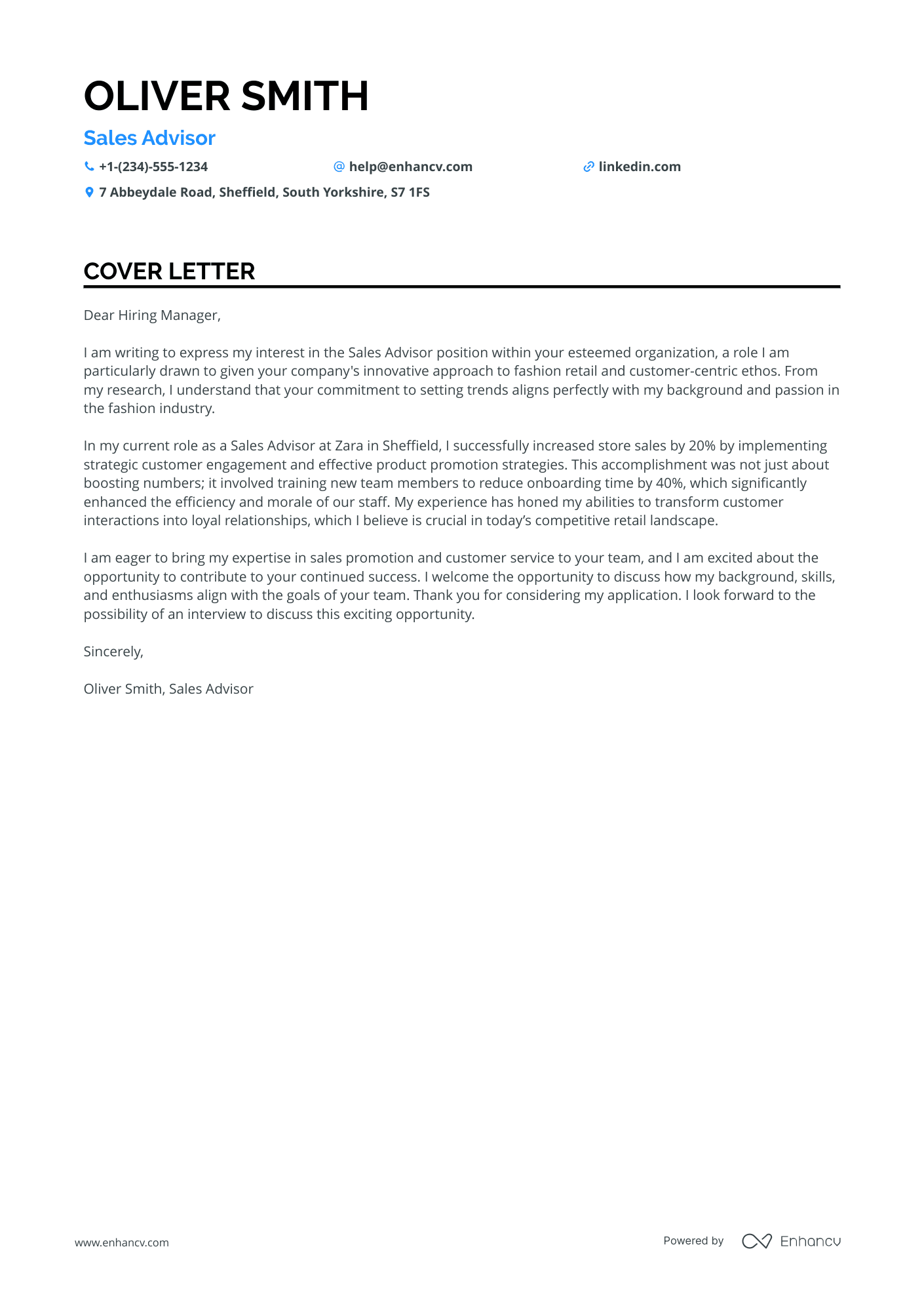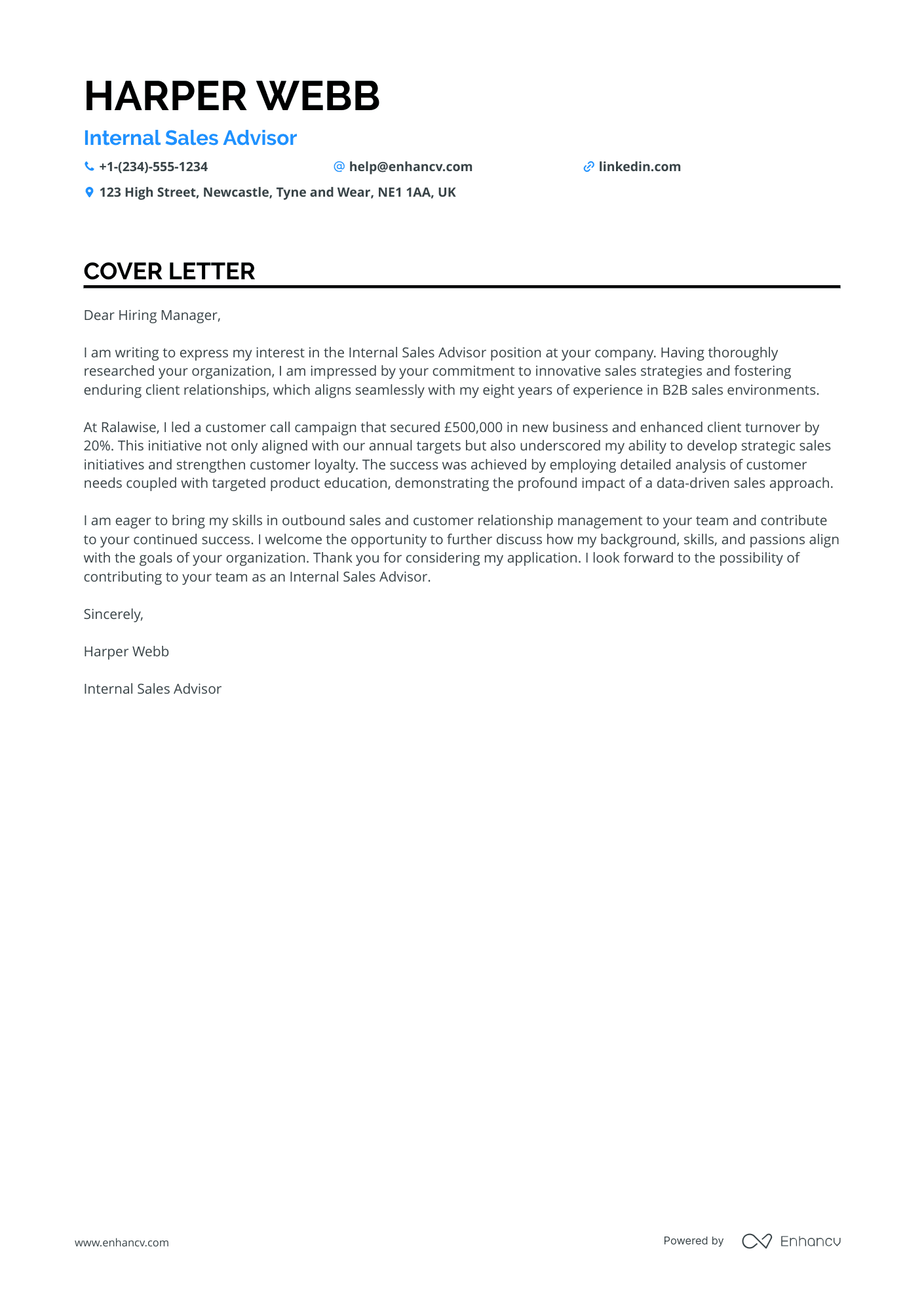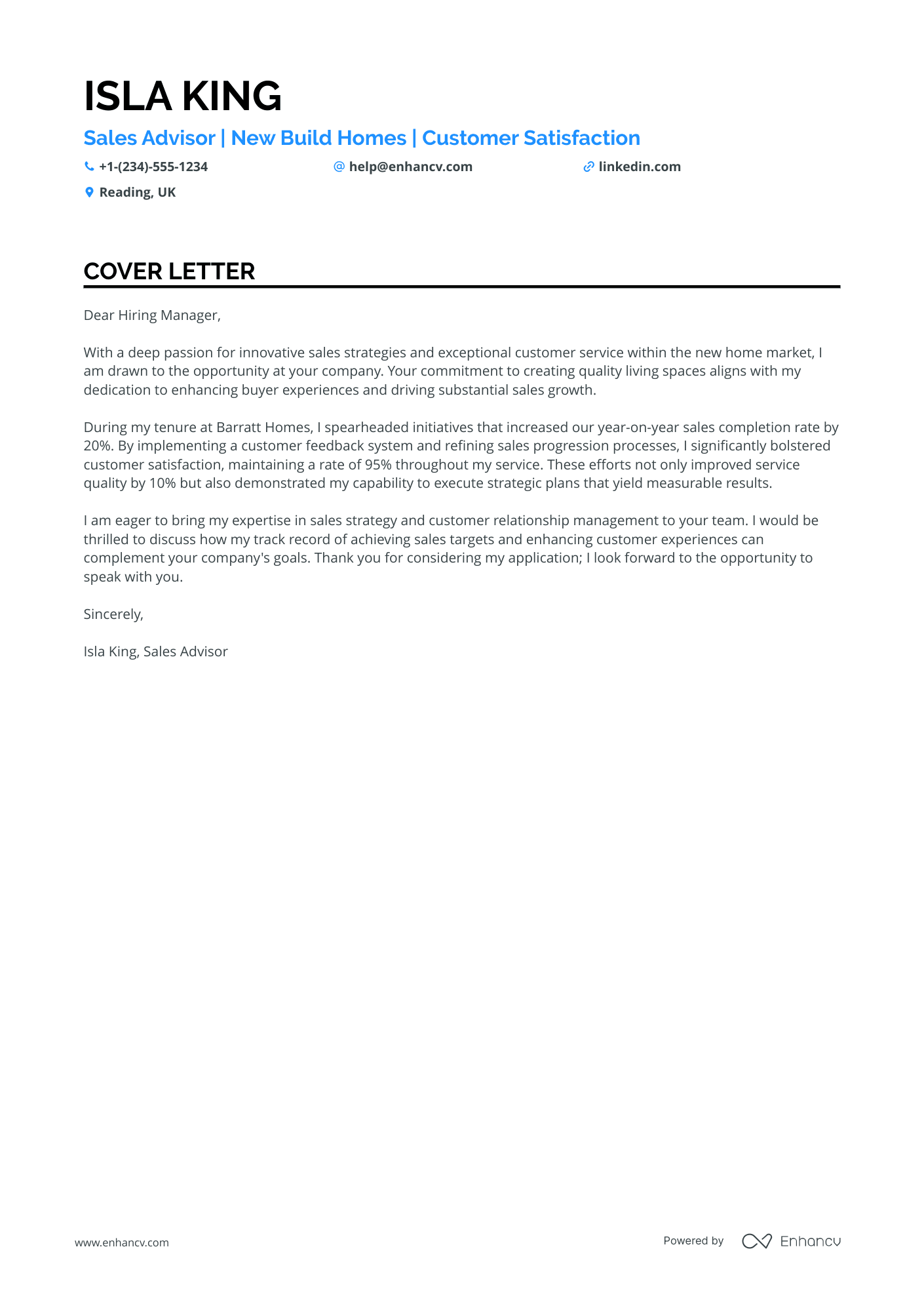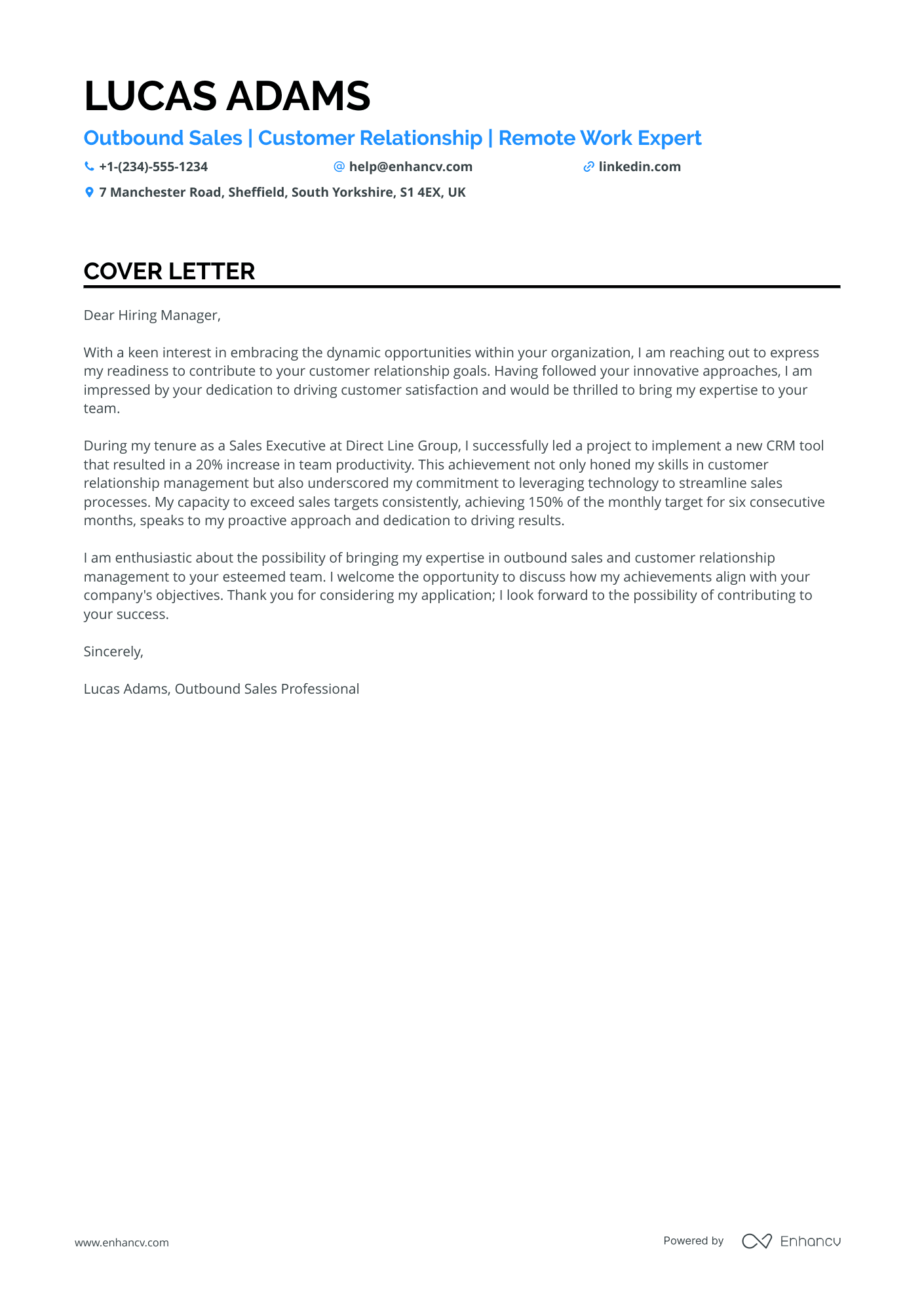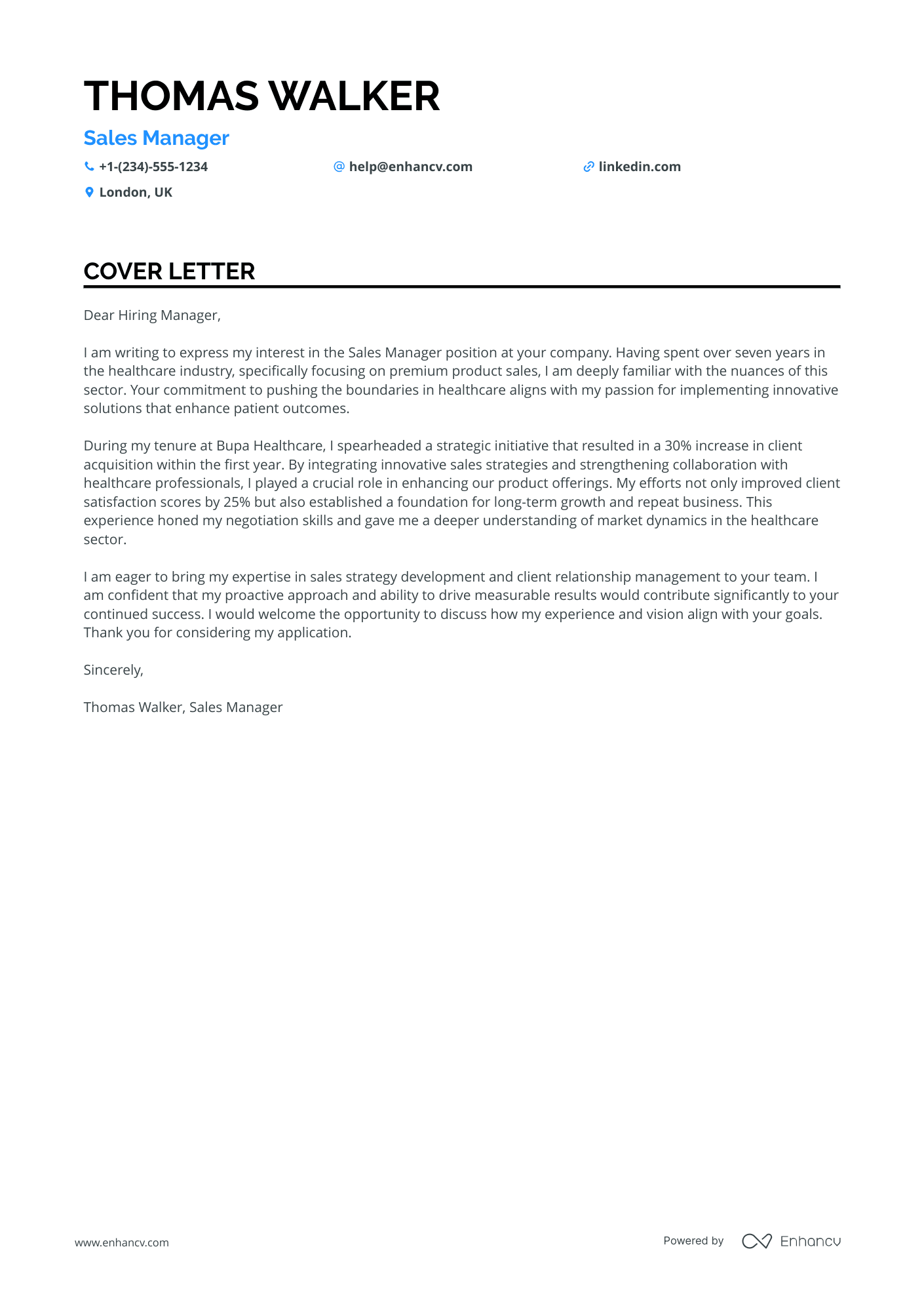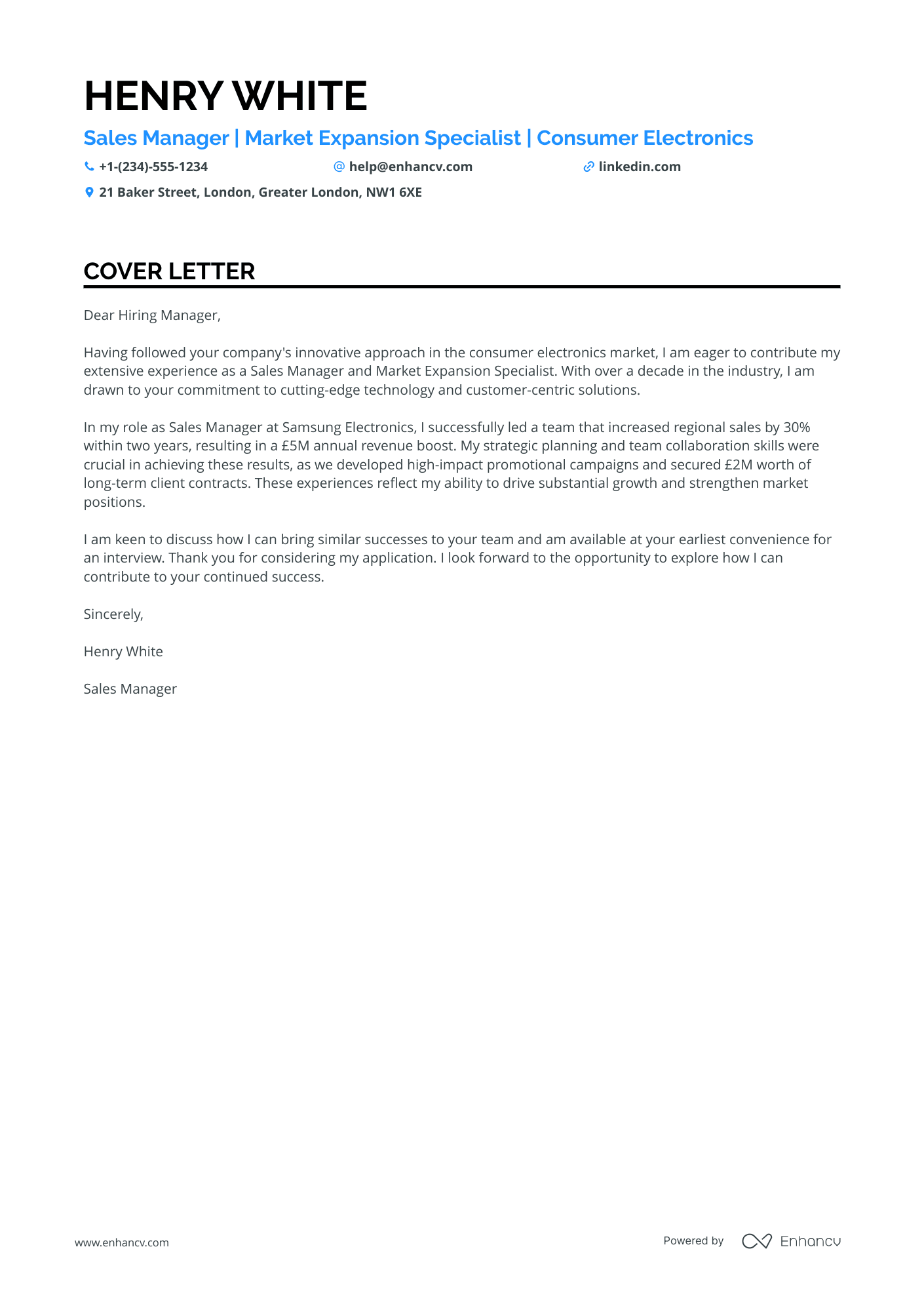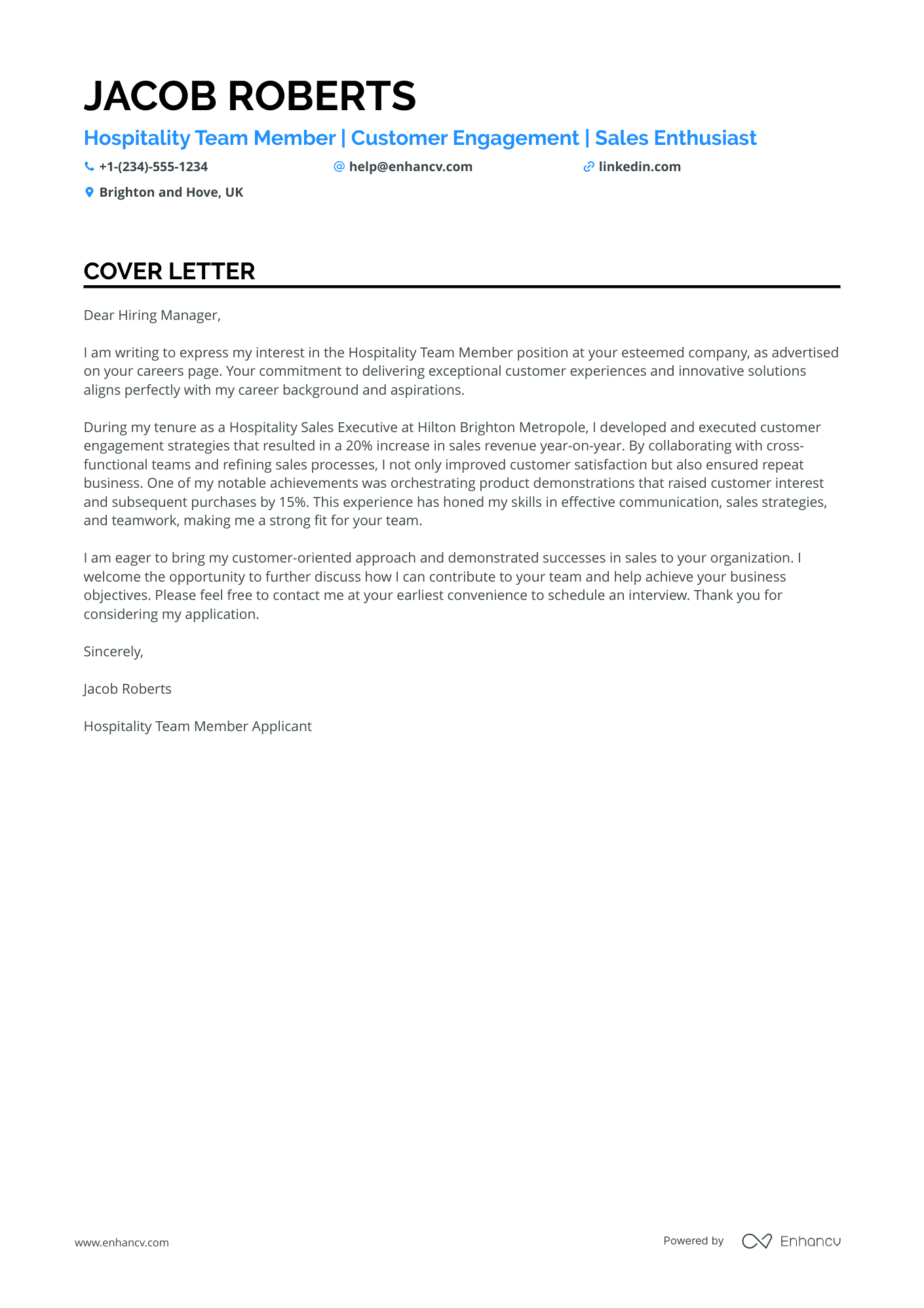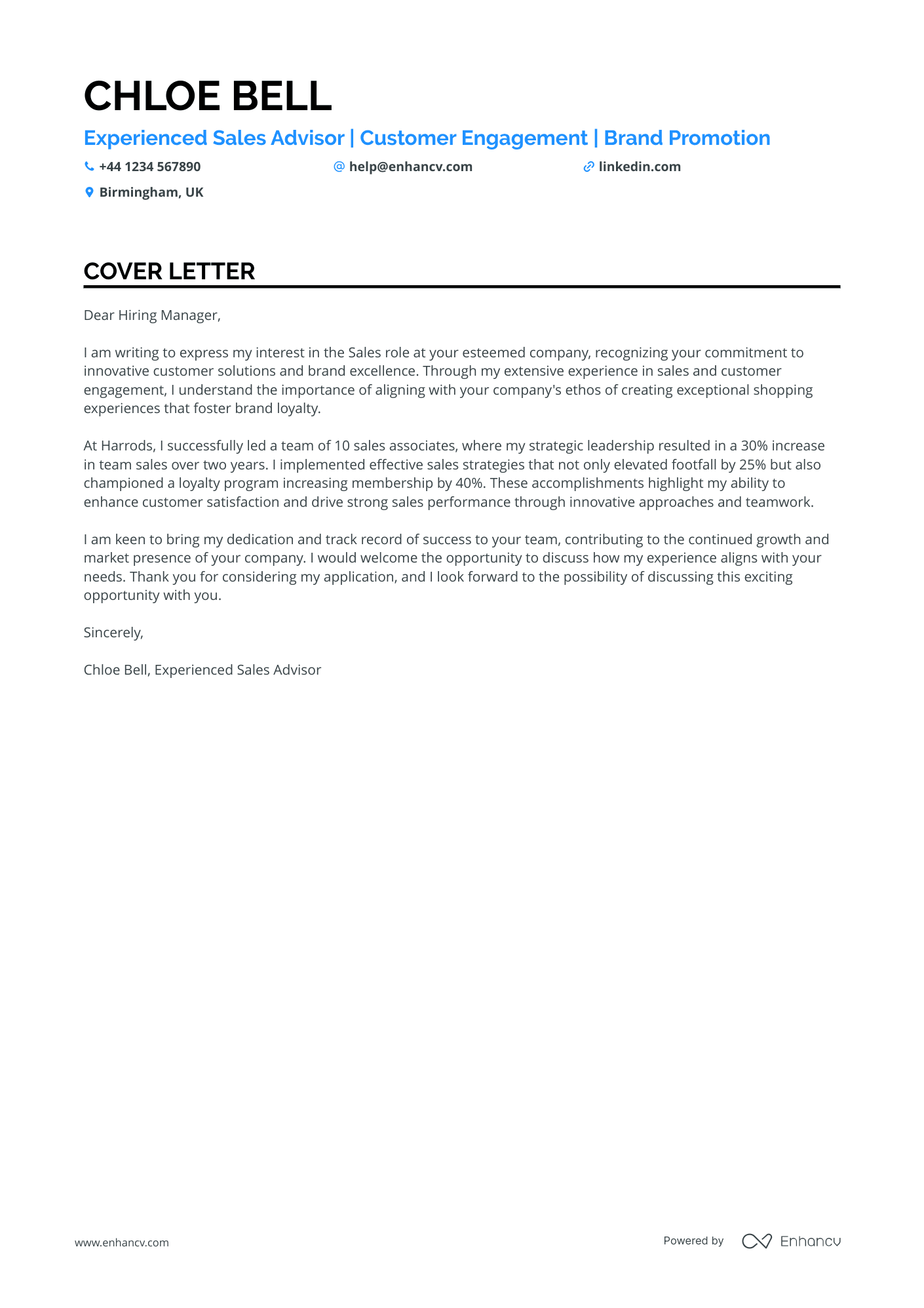Congratulations on completing your first cover letter. However, as you look back, you realise it’s simply a copy-paste of your CV.
Repeating your curriculum vitae is a common pitfall that many candidates encounter, making the cover letter redundant.
Your cover letter should provide fresh insights, adding more value to your application. It’s also the ideal space to address career gaps or major transitions that might not be covered in your CV.
In this guide, you’ll learn how to use your cover letter to demonstrate why you’re the best candidate for the role, while confidently addressing your career history and key achievements.
Cover letter examples for sales advisor
By Experience
Senior Sales Advisor
- Highlighting the candidate's 8 years of experience in the housebuilding industry, demonstrating their expertise and credibility in property sales.
- Mentioning the implementation of a new CRM strategy that led to a 15% reduction in reservation cancellations showcases their problem-solving and strategic development skills, which are crucial for a sales advisory role.
- Including the achievement of consistently exceeding sales targets and maintaining high customer satisfaction scores, which illustrates their ability to drive revenue and cultivate positive client relationships.
- Referencing advanced qualifications such as a Master of Science in Real Estate shows a high level of dedication and specialised knowledge that can benefit the employer.
Junior Sales Advisor
- Specific Experience in Real Estate Sales: The cover letter highlights the candidate's relevant experience in new home sales through roles at Taylor Wimpey and Barratt Developments, making their application fitting for a Junior Sales Counsellor role.
- Quantifiable Achievements: By showcasing percentage improvements in client engagement and satisfaction, the candidate provides clear evidence of their successful contributions and impact in previous positions.
- Relevant Skills and Certifications: Mentioning proficiency in Salesforce CRM, market analysis, and a Real Estate Professional Certification demonstrates the candidate's preparedness and qualifications for the role, aligning with industry standards.
- Passion for the Industry: The inclusion of personal passions such as home design and architecture suggests a genuine interest in the field, which can be appealing to potential employers looking for enthusiastic and driven candidates.
Associate Sales Advisor
- Quantifiable achievements: Including specific figures such as a 20% increase in sales helps demonstrate the tangible impact of skills and efforts in the role.
- Role-specific skills: Highlighting proficiency in CRM solutions and strong customer relationship building skills are directly relevant to sales and customer service roles.
- Accomplishments in training and leadership: Mentioning leadership in team training that improved efficiency by 25% shows capability in management, an asset for roles that may require training new staff.
- Customer-focused success: Achieving a 95% customer satisfaction rate underlines strong customer service abilities, a key expectation in the role of a sleep advisor.
Lead Sales Advisor
- Highlighting Achievements: It's crucial to emphasise specific achievements, such as generating over £500K in new revenue annually and securing top sales recognition. This demonstrates the impact and value brought to past employers.
- Use of Specific Metrics: Incorporating metrics like "30% year-on-year revenue growth" or "20% customer retention improvement" provides concrete evidence of success, making claims more credible and powerful to potential employers.
- Relevant Skills and Certifications: Mentioning certifications like "Advanced Sales Techniques" and skills like CRM proficiency indicates preparedness to apply industry best practices and technical proficiency, vital for a Sales Lead role.
- Diversified Experience: Detailing diverse experiences across different companies and roles highlights versatility and the ability to adapt and excel in various settings, which is attractive in a competitive field.
By Role
Sales Advisor for Retail
- Emphasising specific achievements, such as contributing £500K in sales, can showcase the candidate's potential impact on sales performance and ability to meet and exceed targets in luxury retail.
- Highlighting leadership roles like mentoring team members or leading visual merchandising revamps can demonstrate managerial skills and the ability to enhance team productivity and store aesthetics.
- Mentioning a relevant education and training background, such as a Master of Arts in Fashion Marketing, can underscore the candidate's specialised knowledge in retail and fashion industry dynamics.
- Incorporating language skills, such as proficiency in French, in addition to English, may be advantageous for roles in luxury retail where interacting with international clients is frequent.
Technical Sales Advisor
- Highlighting Industry Experience: The cover letter effectively showcases over 5 years of experience in technical support and sales specifically within the transportation and mobility sector, aligning with industry expectations for the role.
- Emphasising Technical Skills and Certifications: The inclusion of technical skills such as project management and product recommendation, alongside relevant certifications like the Advanced Technical Support for Sales, underscores the candidate’s technical credibility.
- Demonstrating Achievements with Quantifiable Results: The letter specifically mentions quantifiable achievements, such as a 20% increase in customer satisfaction, which helps to convey the candidate’s impact in previous roles.
- Illustrating Cross-functional Collaboration: By highlighting cross-team collaboration and its positive outcomes, like reducing product development time by 15%, the letter demonstrates the ability to work effectively within diverse team structures.
Automotive Sales Advisor
- Emphasising relevant certifications like the "Automotive Service Advisor Certification" from the Institute of the Motor Industry (IMI) to demonstrate specialised expertise in customer service and parts sales strategy.
- Highlighting specific achievements such as the "Customer Satisfaction Award" for achieving a 95% customer satisfaction rate, which underscores the candidate's ability to enhance customer relations and improve company reputation.
- Detailing quantifiable results, such as the 20% increase in service sales during tenure at Inchcape UK, to effectively showcase the candidate's impact in previous roles.
- Showcasing a comprehensive skill set with proven experience in "VHC Pricing" and "Invoicing", which are crucial for a Service Advisor role to ensure precise financial and service operations.
Telecommunications Sales Advisor
- Highlight Quantifiable Achievements: The cover letter effectively emphasises measurable successes, such as increasing customer satisfaction by 20%, which provides concrete evidence of the candidate's capabilities.
- Utilise Industry-Specific Language: Use of terms such as "consultative sales approach" and "customer experience process" demonstrates familiarity with telecommunications and sales sectors, appealing directly to potential employers in this field.
- Emphasise Relevant Experience: Listing prior roles and responsibilities within reputable companies like BT Group and Vodafone lends credibility and aligns with the specific skills required for a Telecommunications Sales Associate.
- Incorporate Professional Development: Mentioning educational background and relevant courses like 'Effective Communication and Sales Techniques' highlights a commitment to continuous professional growth, which is attractive to employers.
Pharmaceutical Sales Advisor
- Highlighting Advanced Sales Techniques: The cover letter demonstrates proficiency in advanced sales techniques, which are crucial for a Senior Pharmaceutical Sales Specialist, emphasizing achievements like a 30% sales increase and successful new product launches.
- Emphasis on Customer Engagement and Clinical Acumen: The letter showcases the ability to foster customer engagement and interpret complex clinical data, reflecting skills important for influencing prescribing behaviours and improving patient outcomes.
- Showcasing Relevant Achievements: Mentioning specific accomplishments such as increased prescription volumes, expanded market share, and enhanced digital engagement strengths the candidate's reliability and capacity to drive meaningful results in pharmaceutical sales.
- Relevant Education and Certifications: The inclusion of a Master's degree in Pharmaceutical Sciences along with specialised courses such as Advanced Pharmaceutical Sales Strategies further substantiates expertise and aligns the candidate with the specialised demands of the role.
Real Estate Sales Advisor
- Highlight Relevant Certifications: The mention of the "Certified Commercial Investment Member (CCIM)" certification underscores Ruby Gibson's proficiency and expertise in commercial real estate and investment analysis, which is crucial for an Investment Strategist.
- Detail Quantifiable Achievements: Citing specific figures, like the £275,000 commission revenue in 2022 and exceeding personal and team benchmarks by 22%, demonstrates a successful track record in investment management, making the case for effectiveness in similar roles.
- Showcase Leadership and Team Development Skills: Emphasising leadership experience, particularly leading a team of 10 investment advisors and corroborative results, such as a 35% increase in closed deals, indicates capability in enhancing team performance.
- Highlight Industry-Specific Expertise: The cover letter's focus on real estate investment activities, such as innovative client relationship models that reduce closing times, displays a deep understanding of the sector's unique dynamics.
Sales Advisor for Financial Services
- Highlight accomplishments in target achievement, such as the 30% increase in sales revenue, to showcase results-driven capabilities essential for a financial advisor.
- Emphasise roles that involve client relationship management and customer retention, crucial for building trust and navigating financial advisory contexts.
- Mention leadership experience, like managing a team of junior advisors, to illustrate readiness for responsibilities and fostering teamwork.
- Include relevant certifications, such as the Financial Planning & Analysis Certification, to underscore expertise in advanced financial planning practices.
Beauty Sales Advisor
- Emphasising a proven track record of increasing sales by 25% and boosting customer satisfaction through tailored solutions and effective communication techniques, which is critical for a Sales Advisor role focused on customer engagement.
- Highlighting the "Effective Sales Techniques Certification" which strengthens credibility as a skilled sales professional, focusing on advanced sales strategies and communication essential for effective customer interaction.
- Demonstrating expertise in problem-solving and process improvement, such as introducing a new reservation system that decreased booking time by 30%, showcasing initiative and innovation in streamlining operations.
- Mentioning a passion for the travel and hospitality industry, which indicates an intrinsic motivation and alignment with the company's industry, enhancing the likelihood of cultural fit and genuine enthusiasm in the role.
Travel Sales Advisor
- Focus on quantifiable achievements, such as increasing customer retention rates by 30%, to provide evidence of your impact in a Customer Sales Advisor role.
- Highlight your strong background in sales and customer relationship management, emphasising skills and experiences like upselling products and developing strategic initiatives.
- Showcase relevant certifications, such as the Advanced Sales Techniques Certification, to demonstrate a commitment to professional development and expertise in sales.
- Incorporate specific software knowledge, such as Salesforce, to underline your technical proficiency and readiness to engage with modern sales tools.
Fashion Sales Advisor
- Experience and Achievements: The cover letter effectively highlights Oliver's extensive experience in fashion retail and his impressive accomplishments, such as consistently exceeding sales targets and implementing successful sales promotions, which are crucial for a Sales Advisor role.
- Education and Relevant Courses: Oliver's academic background in Fashion Marketing and Retail Management provides a solid foundation for understanding market trends, while specialised certifications like the Fashion Trend Analysis Certification demonstrate his commitment to staying updated in the industry.
- Customer Engagement Skills: The cover letter emphasises Oliver's strengths in customer service and team development, which are essential for enhancing customer satisfaction and team performance in a retail environment.
- Passion for Fashion: By mentioning his passion for fashion blogging and community volunteering, Oliver showcases his enthusiasm for the industry and his commitment to making a positive impact beyond his professional responsibilities.
Sales Advisor for IT Solutions
- Relevant Experience and Achievements: The cover letter effectively highlights the candidate's extensive experience in B2B sales and significant achievements, such as increasing client turnover by 20% and securing £500,000 in new business, which are crucial for the role of Internal Sales Advisor.
- Specific Skills and Certifications: The candidate mentions specific skills such as CRM Systems, Sales Strategy, and Outbound Sales, along with certifications like CRM Management from Salesforce, which are pertinent to the sales advisory role, bolstering their suitability.
- Educational Background and Continued Learning: The cover letter includes a solid educational foundation with an MBA and mentions ongoing learning through courses like Advanced Sales Techniques, indicating continual professional development relevant to the sales field.
- Passion and Industry Engagement: Expressing a passion for the garment decoration industry and sustainable business practices adds a personal touch and demonstrates alignment with potential company values, indicating a focus on long-term industry engagement and innovation.
Sales Advisor for Insurance
- Emphasise the consistent overachievement of sales targets as a testament to results-driven performance, which is crucial for a Sales Advisor role.
- Highlight strong customer service and relationship management skills, underlining the ability to maintain high customer satisfaction rates and streamline communication processes.
- Present experience in process improvement and achieving significant efficiency gains within sales operations, relevant for enhancing sales workflows and achieving tight deadlines in new build homes.
- Showcase advanced knowledge and certification in property law, which is advantageous for complex real estate transactions and ensuring compliance.
Sales Advisor for Home Appliances
- Highlight Sales Achievements: Lucas emphasises his remarkable success in surpassing sales targets, including achieving 150% of the monthly target for six consecutive months, which is highly relevant for a sales-oriented role.
- Emphasise CRM and Remote Work Expertise: Lucas mentions his leadership in implementing a CRM tool and his adaptability to remote work, showcasing his technical skills and ability to manage customer relationships effectively.
- Showcase Leadership and Training Abilities: Beyond sales, Lucas demonstrates his ability to lead and train teams, as seen in his role in training new representatives and decreasing onboarding time, which is beneficial for sales management positions.
- Highlight Relevant Education and Continuous Learning: Lucas's academic background in Marketing and Business Administration, combined with ongoing sales and CRM training, underscores his commitment to professional growth and relevance in the sales industry.
Sales Advisor for Luxury Goods
- Highlighting specific achievements, such as a 120% sales target achievement and a 30% increase in client acquisition, provides concrete evidence of success and aligns with the role's emphasis on sales performance.
- Showcasing leadership and team collaboration skills, illustrated by a 95% success rate in team sales targets and developing a unique training module, reflects essential managerial competencies for the Sales Manager role.
- Mentioning relevant certifications, such as the Healthcare Marketing Certification, emphasises specialised knowledge and expertise in the healthcare sector, which is crucial for this industry-specific role.
- Demonstrating a strong passion for healthcare innovations adds a personal touch and aligns personal interests with professional goals, enhancing the candidate's fit for the healthcare-focused role.
Sales Advisor for Consumer Electronics
- Highlighting industry-specific experience: The cover letter effectively underscores Henry White's over 10 years of experience in consumer electronics, which is crucial for establishing credibility and expertise in this specialised field.
- Showcasing measurable achievements: It provides concrete outcomes such as a £5M increase in revenue and a 30% rise in regional sales, demonstrating tangible success and impact.
- Emphasising leadership and management abilities: By mentioning the leading of a sales team, improvement in team productivity, and cultivating client relationships, the letter illustrates strong managerial capabilities.
- Incorporating educational background and courses: The inclusion of advanced education and relevant certifications, such as the Strategic Sales Management Course from Columbia Business School, strengthens the application, highlighting continuous professional development.
Sales Advisor for Hospitality Services
- Emphasise Relevant Experience: Clearly highlight the 3+ years of experience in hospitality, showcasing the applicant's proven track record of delivering exceptional customer experiences and driving sales.
- Showcase Measurable Achievements: Use quantifiable accomplishments such as increasing sales revenue by 20% annually and enhancing guest satisfaction scores by 30% to demonstrate the applicant's effectiveness and impact in previous roles.
- Highlight Advanced Skills and Certifications: Mention specific skills such as customer service and sales management, along with courses like "Advanced Upselling Techniques" and "Hospitality Customer Service Excellence," to establish credibility and specialised knowledge in the field.
- Include Leadership and Collaborative Abilities: Underline experiences that demonstrate teamwork and mentorship, such as mentoring junior team members and collaborating with cross-functional teams, to showcase leadership potential and the ability to work effectively with others.
Sales Advisor cover letter example
Chloe Bell
Birmingham, UK
+44 1234 567890
help@enhancv.com
- Emphasize strategic leadership achievements that align with the role's objectives, like leading a team and driving a significant increase in sales performance.
- Highlight innovative sales strategies, illustrating your ability to increase customer footfall and enhance loyalty program membership, which are key to customer-focused sales roles.
- Include quantifiable outcomes, such as specific percentage increases, to concretely demonstrate your impact and effectiveness in past roles.
- Demonstrate an understanding of the company's values and mission, showing genuine interest and strategic alignment with the brand's goals.
Importance of cover letters in the United Kingdom
Cover letters are a vital part of professional job applications, helping shape recruiters' first impression of your profile.
Here’s why they’re important:
- Indicates your genuine interest: A well-researched cover letter reflects your knowledge of the company and role.
- Professionalism from the outset: Employers expect your cover letter to be structured, polite, and formal. If you wish to add a more personalised touch, be sure to address your recipient directly.
- Capture the recruiters' attention: For most roles, candidates tend to have rather similar experience, which is why you should use your cover letter to explain what is unique about your profile.
What UK employers expect from a cover letter
When writing your cover letter for a UK employer, it’s important to keep several things in mind. First, you need to conduct a thorough research, which includes reading up on the company’s website, recent news, and their presence on social media. Understanding the company’s latest achievements and its overall mission will allow you to tailor your letter to their specific needs.
Next, focus on the company’s core values. Whether they value teamwork, innovation, or community involvement, highlighting how your own experience aligns with these principles is essential.
Finally, don’t forget to match your skills to the job’s requirements. Study the job description carefully and pick out the most important qualifications or competencies. Then, provide evidence of how you meet those criteria with concrete examples from your past work experience.
How to format a sales advisor cover letter
Keep in mind that your cover letter is intended for the recruiters' eyes only, not for the Applicant Tracking Systems (ATS) software that aligns your job application with role requirements. That's why it's essential to concentrate on the quality of the content and presentation to make a memorable first impression.
Don’t forget to include:
- Your address and contact details
- The employer’s name and address
- Date
- Greeting
- Introductory paragraph
- Body paragraphs
- Closing paragraph
- Sign-off and signature
Now for some formatting tips and tricks: choose modern fonts such as Rubik, Volkhov, or Raleway instead of traditional ones like Arial. Keep your cover letter single-spaced with margins of around 1-inch (2.5 cm). To maintain a professional and consistent look, ensure that both your CV and cover letter use the same font style.
Lastly, always send your cover letter as a PDF to preserve its formatting and prevent any edits once it's sent, ensuring your design and layout remain intact for the recruiters.
How to write your sales advisor cover letter salutation
It's never advisable to begin your cover letter with 'Dear Sir/Madam', as it sounds comes across as impersonal.
Take the time to find out who is hiring for the role and address them directly in your cover letter greeting (e.g., 'Dear Mrs Chanceworth', 'Dear Harrod').
If you're uncertain where to find the hiring manager’s name, check the company website, look on LinkedIn, or send a courteous email requesting this information. Don't hesitate to ring reception either—they are unlikely to refuse to assist.
How to write your sales advisor cover letter intro
One of the best ways to grab a hiring manager's attention? Show them the unique value you'd add to the team.
Review the skills or requirements listed in the posting and draw connections to your previous work experiences.
Focus on specific (and quantifiable) accomplishments and qualifications that align with the job description to make a strong first impression.
How to write your sales advisor cover letter body
A well-written cover letter body goes beyond the content of your CV, expanding on your greatest achievement to form your compelling case.
The narrative you tell within it could focus on a few key elements:
- A concrete and noteworthy achievement: Backed by data and relevant to the job.
- Your hard and soft skills: Presented with measurable outcomes and results.
- A successful project: Showing how you contributed to the final result.
The goal is to tell a story that aligns with the company’s needs and adds a more human touch to your application.
How to write a closing paragraph
Looking to leave a lasting impression with your cover letter closing?
Then, you should certainly end with a promise—one that outlines what you aim to achieve in the role. Ensure your goals are realistic and align with the company’s needs.
You might also include a call to action, enquiring when you can expect to hear back and what the next steps in the hiring process will be.
Conclusion
A well-crafted cover letter can significantly enhance your job application and set you apart from other candidates. Begin by personalising your message to the hiring manager and connecting your experiences to the company's values.
Emphasise your key accomplishments that reflect your skills and passion for the role, while maintaining a professional tone throughout. Ensure that your cover letter and CV present a unified and polished image to maximise your chances of success.
